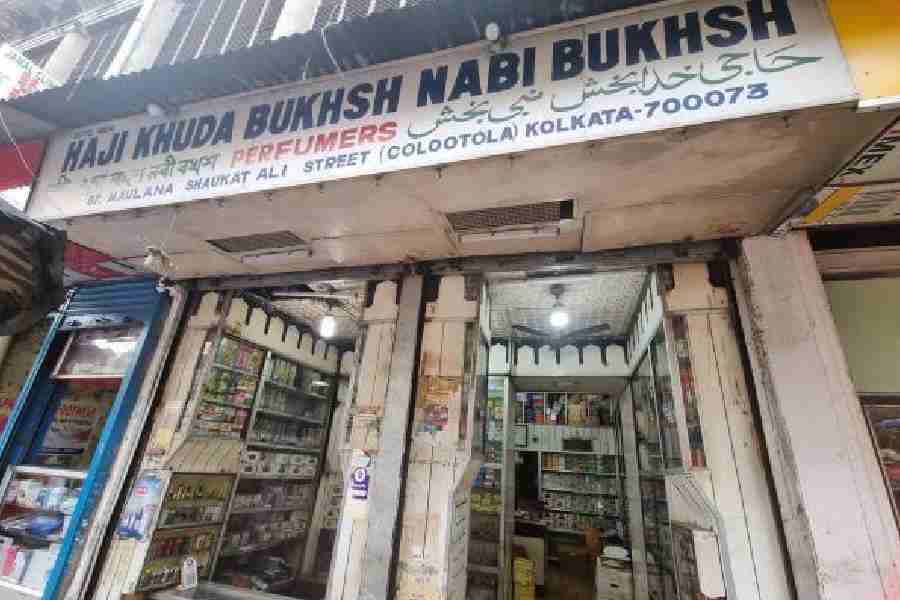Entrepreneurs, start-ups, sharks, investors — these are familiar words for millennials and Gen Z. But as early as 19th century there were some Indian ‘sharks’ who read market and set up shop in Calcutta. Several such heritage shops that were set up before Independence continue to do business to this day. The current generation of owners who run these retail outlets have held on to the rich legacy of their forefathers, although they have sometimes reinvented the way they do business. They have fascinating stories of the bygone era to tell. Here are a few such iconic shops in the city and their stories.
Haji Khuda Bukhsh Nabi Bukhsh Perfumers
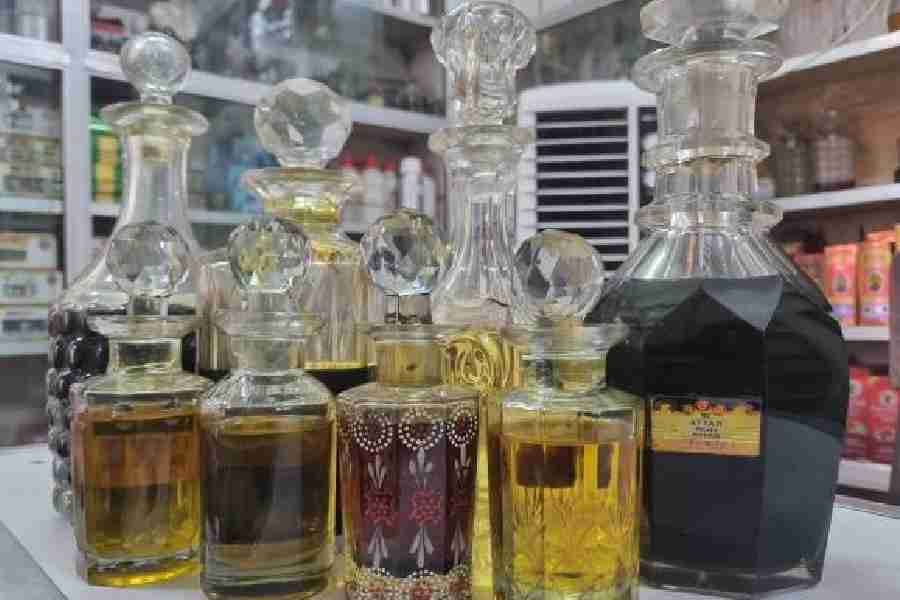
A selection of attars in antique decanters at Haji Khuda Bukhsh Nabi Bukhsh
Retails: Attar
Where: 87 Maulana Shaukat Ali Street (Colootola Street), Calcutta 700073
Established in: 1824
Neyazuddin Allah Buksh is the eighth generation currently at the helm of the oldest attar store in Calcutta, along with his nephew. His ancestors came to the city, which was then the capital of undivided India, in the early 1800s from Lucknow. An ancestor of his was aware that ‘Bengali zamindar babus’ were fond of attar and there was a market to be tapped. Hence, he opened this shop in 1824. It was named after the father and son duo — Haji Khuda Bukhsh-Nabi Bukhsh. “Political leaders of then undivided India, like Pandit Jawaharlal Nehru, Netaji Subhash Chandra Bose and his family, Liaquat Ali Khan and Huseyn Shaheed Suhrawardy (both later became prime ministers of Pakistan) were our customers. Kaviguru Rabindranath Tagore, Kazi Nazrul Islam, Sheikh Mujibur Rahman and many others used to buy attar from our shop. Gulaab, bela, rajnigandha, khus, sandal, shamama were popular choices then,” said Neyazuddin, who has been managing the shop for over 30 years now.
On the shelves you will be able to spot several handmade Belgian glass decanters which are as old as the shop itself and contain exotic fragrance attars in myriad colours. These decanters, he informed, aren’t manufactured any longer so he has to make do with Indian ones.
On the verge of completing a double century next year, Neyazuddin says demand for attar is again coming back among the youth in spite of tough competition from “local and foreign scents”. They have been recreating attars which are “lighter” and “similar to scents” like white musk, Hayati, Magnet, and Ice Blue. The most expensive attar at his store is Oud, which starts from Rs 1,000 for 8ml and goes up to Rs 25,000. “Oud ka demand abhi bar raha hai,” he added. The shop is open from Monday to Saturday, 9.30am to 9pm.
Nursing Chunder Daw & Co.
Retails: Firearms and swords
Where: 9, B.B.D. Bag East, Calcutta 700001
Established in: 1835
Narasingha Chandra Daw had opened his first shop of guns and arms in Old China Town in 1835. The British rulers and zamindars of Bengal made for a good clientele. His younger son, Nandalal Daw, started operating Nursing Chunder Daw & Co — Gun Makers from the then Dalhousie Square (now B.B.D. Bag) in 1896. “Since Nandalal didn’t have any children, he gifted this shop to his nephew whom he loved a lot. We are all descendants of Ashutosh Daw, who has another gun shop in Dharmatala named after him. The fifth and sixth generation of the Daw family now takes care of this shop,” said Sudeep Daw (67), his brother Subrata by his side. The 188-year-old shop has guns, rifles, revolvers, pistols and swords.
During British rule, around 1800s, muzzle-loading guns with bayonet were popular. Even if the gun didn’t fire, the bayonet could be used to attack. “In Bengali these were called gada bonduk. Licences weren’t required initially. After 1857’s Sepoy Mutiny, licences came into use for purchasing guns only, and not gunpowder. Our own nouka, majhi would fetch gunpowder from the other side of Ganga. Durwans were also sent to prevent dacoity,” shared Sudeep. Then came double barrel breech loading (DBBL) guns at the fag end of the 19th century. N.C. Daw & Co. used to import them from a company named Eley in the UK. Business was hit during World War I, World War II and the Calcutta Riots of 1946.
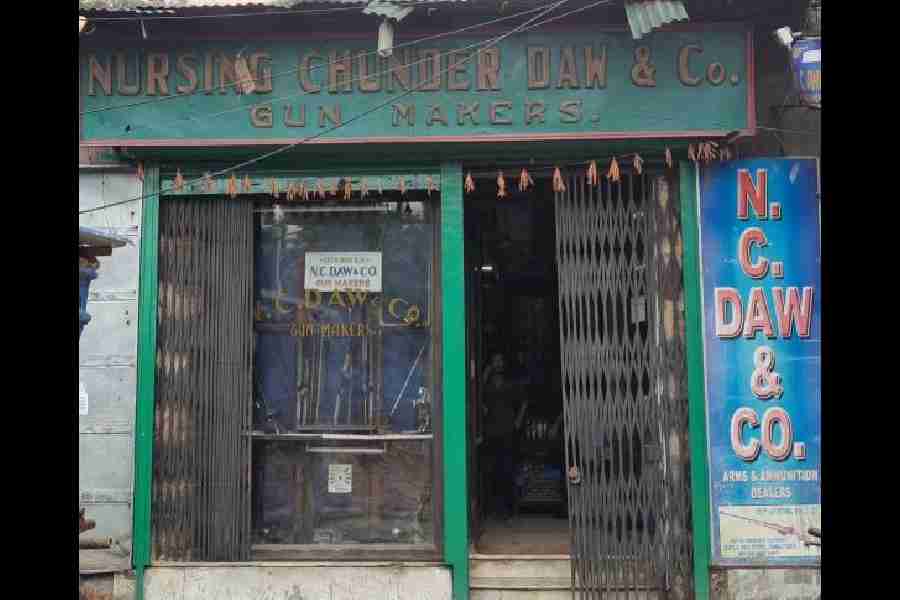
Gun makers Nursing Chunder Daw & Company has been operating from the same premises from as far back as 1835
Sudeep had started coming to the shop since the 1970s after finishing school, he says. The main setback to their flourishing business came in the 70s, during the Naxal movement in Bengal, recalled Daw. Permits became mandatory for selling arms. Earlier, they could sell to any valid licensee. “Puronodin e khub rom-roma chhilo! This business of arms. N.C. Daw was No. 1 in the entire eastern zone. Major pressure was exerted on all arms dealers during the 70s. Times changed, lot of laws were passed, which restricted sales,” he laments.
They now have around 200 pieces of arms to sell. In the 1980s, a young lad from Murshidabad visited with a receipt dated 1952, in tatters, to take his grandfather’s revolver. “This revolver was in our vault for decades, so it took us some time to find, but we did hand it over after all dues were cleared. Charges were as negligible as
Rs 5 to 10 for a month, then,” smiled Daw.
Satyajit Ray sourced a mother-of-pearl sword for his film Satranj Ke Khiladi from this shop. Victor Banerjee’s family weapons have been kept in safe custody at the Daw shop. Sabyasachi Chakrabarty and Abir Chatterjee had visited to get acquainted with using a gun before shooting for Feluda and Byomkesh films.
Butto Kristo Paul, Retails: Medicines
Where: 92B Sovabazar Street, Calcutta 700005
Established in: 1858
Butto Krishna Paul (BKP) belonged to the Gandhabanik caste and was originally in the business of trading spices. A certain Mr Edward had mistakenly left a bag of coins after visiting Butto Krishna Paul’s shop in Khengraputty Lane. On visiting the next day, Paul returned the entire bag of gold mohurs to him, and that is believed to have changed his fortune forever.
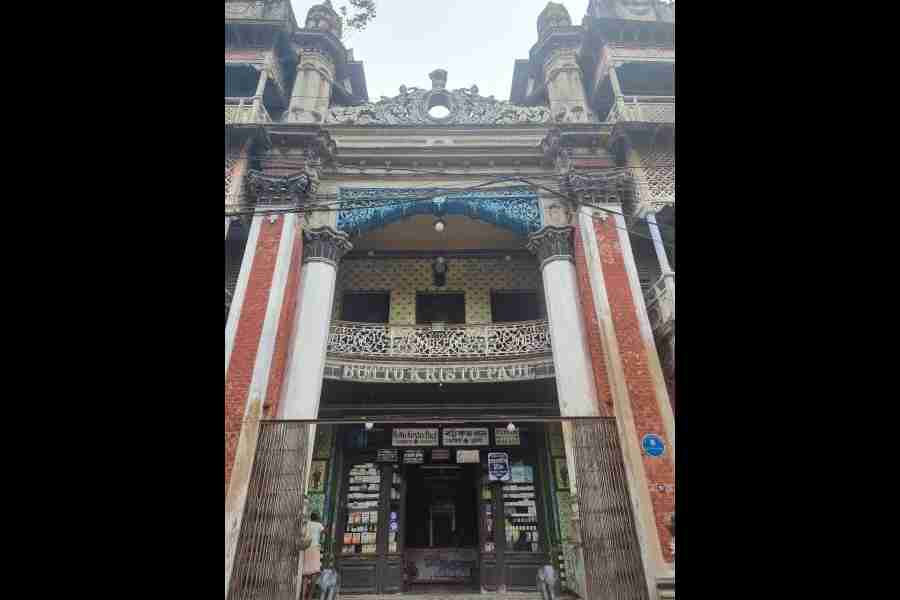
The Butto Kristo Paul medicine shop on Sovabazar Street
“This Edward sahib impressed by his honesty shared a formula of a tonic which would help cure malaria. There were many cases of malaria in the city then. Butto Krishna Paul started making it with mortar and pestle and named it Edward’s Tonic after the gentleman. BKP would distribute it for free. The chemist shop was built in 1858 by his son Harishankar Paul, which is also the joint family’s ancestral home,” informed Bishakha Paul, daughter-in-law of the family. Edward’s Tonic is sold till date and manufactured in a small “factory” behind their chemist store managed by Chandrima Paul, who belongs to the fourth generation.
Edward’s Tonic just didn’t cure malaria it is told. “People must have seen the benefit of the tonic, which is why the demand for it is still high. The tonic is said to cure all kinds of cold, fever, helps in digestion and more. Its demand is still high,” said Bishakha. The business and the ancestral house remain with the family since BKP is believed to have structured his will in a way that both can never be sold. Though the parallel road is named B.K. Paul Avenue after the city’s “first chemist”, the pharmacy is on Sovabazar Street, open from 10am to 11pm, every day.
New Moradabadi Shop
Retails: Brassware
Where: 1 Tarachand Dutta Street, Calcutta 700073
Established in: 1884
Fazal Elahi started New Moradabadi Shop on Tara Chand Dutta Street in 1884 after coming to Calcutta from Delhi, and started selling brass, copper and kansa (bell metal) goods keeping in mind the growing demand. Located bang opposite Royal India Hotel (though Royal opened more than a decade later), it is hard to miss the large biryani handis, hookahs, lamps even before setting foot inside the shop. Kurshid Akhtar, 64, Elahi’s grandson, has been coming to the store for the past 50 years. The store has maintained the bygone era look and feel. “Earlier, these metal products were a part of every household, there was no alternative. People used to gift these items even during weddings. Demand was high and business grew. Then came stainless steel and other alternatives which affected the business,” he rues.
How has he managed to sustain then? “Thank you YouTube,” he says. “We started spreading awareness of these metals and our products through videos on YouTube. Thanks to that, we now have several customers who haven’t come to Calcutta ever. They transfer money online after checking the products; there is no cash-on-delivery system. We aren’t present on any e-commerce sites. Our products are couriered across India and the world — Karnataka, Bihar, Odisha, Qatar, England, etc.,” he adds.
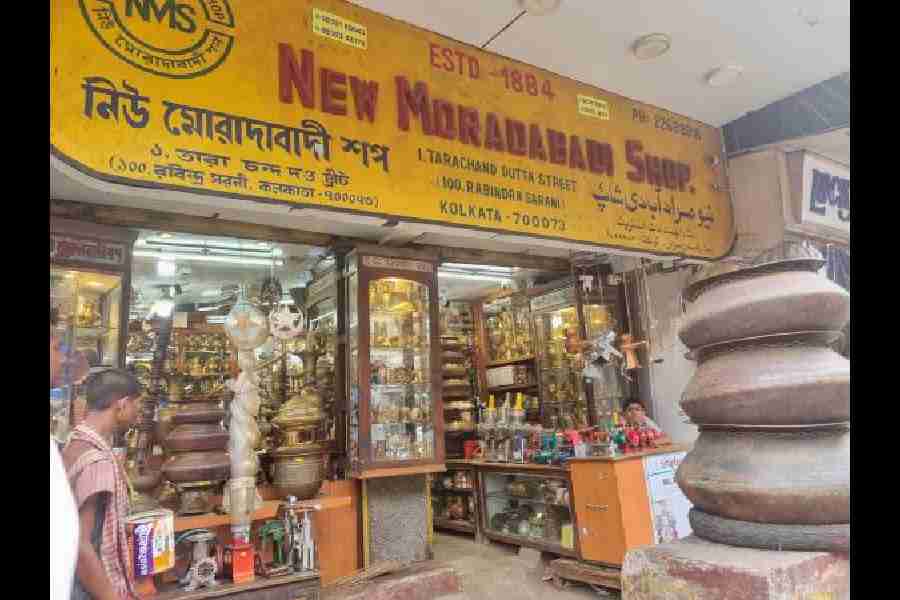
New Moradabadi Shop has been famous for its brassware and now even serves clientele online
Akhtar takes pride not only in the quality of his products but more on their honesty, which he believes has been key in adding new customers. “Main hochhe honesty, integrity and goodwill. Then your customers will be with you. I still have our trade licence from 1944 since British era. We have always kept our paperwork clean since then.”
The shop’s business card reads: “Pakka wajan, pakka hisab” and “Be Indian, buy Indian”. They have no branches and are closed on Sundays. Kurshid, who was born and brought up in this city, signed off by adding Calcutta is the safest, peaceful and most secular city he knows and is glad he has his shop here.
Dasgupta & Company
Retails: Books
Where: 54/3 College Street, Calcutta 700073
Established in: 1886
Calcutta’s College Street has been the epicentre of books, schools and colleges for at least the last couple of hundred years. Girish Chandra Dasgupta, who hailed from an educated family in Jessore (now in Bangladesh) came to Calcutta back in 1886, with a vision of opening a bookstore. Girish opened his first bookstore, a tiny one, at 10 Shyamacharan Dey Street (parallel to College Street). Dasgupta later shifted to 54/3 College Street, diagonally opposite the erstwhile Presidency College (now Presidency University), in 1902. This is where the shop operates from even now. Every wooden bookshelf in the shop is packed with books, neatly arranged and tagged according to different subjects — economics, philosophy, sociology, etc.
“My great-grandfather started with around 70 books. We now have over 70,000 books. Higher studies before Independence under the British meant it had to be in the English language, hence most books were bideshi, from England, USA and Japan,” said Arabinda Dasgupta, 71. This led Girish to start their own publication in 1888, with chemistry and physics books in Bengali for students in rural areas. They continue to publish books even today.
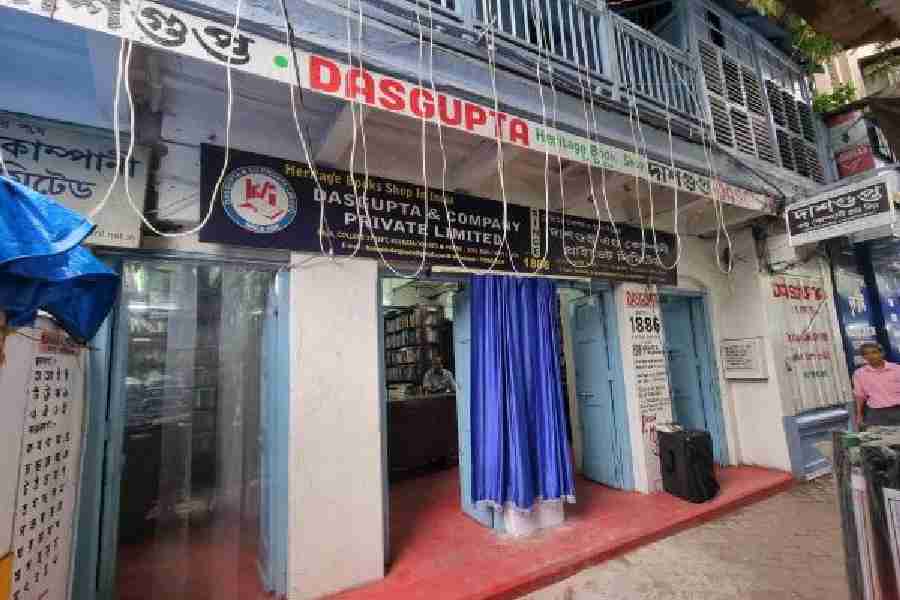
The Dasgupta & Company bookstore that is a College Street landmark for over a century
The heritage bookstore has had many eminent scholars, academicians and teachers among other book lovers as patrons — Ishwar Chandra Vidyasagar, Jagadish Chandra Bose, Asutosh Mookerjee, Satyendranath Bose, Meghnad Saha, Humayun Kabir, Satyajit Ray, Amartya Sen... and the list continues.
“A lot of students who come to the shop to buy books, check books and leave. Most can’t afford books even now. Good books are expensive. That’s why I always wanted to start a library, which is now being set up on the third floor. That floor will now have a Dasgupta archive section (with memorabilia), free-reading library and a free auditorium,” says Arabinda. The library is scheduled to start post Durga Puja. The bookstore remains open Monday to Saturday, 10am to 7pm.
A. Tosh & Sons
Retails: Tea
Where: 11/1 Mahatma Gandhi Road, Calcutta 700009
Established in: 1897
It was Prabhash Chandra Ghosh who established A. Tosh & Sons in 1897 in his father Ashutosh’s name. “This business started very humbly as a cottage industry. Prabhash Chandra Ghosh saw a demand in tea in the city and decided to source tea, got it packed in the house and started selling it. Our great-grandmother used to pack teas in thongas and he used to ferry them across. The British couldn’t pronounce Ashutosh in the auction system where he used to buy from, so that’s how it was shortened to A. Tosh,” said Abhijit Ghosh, director, and a fourth-generation family member.
The very first retail store, also the company’s registered office till 1950, came up on the erstwhile Harrison Road, now M.G. Road in 1916. In 1920 and 1928, they opened three more stores in Bowbazar, Strand Road and New Market. “This was after he got his brothers into the business. Instead of sitting in one shop they started opening other branches which are still operational,” he adds.
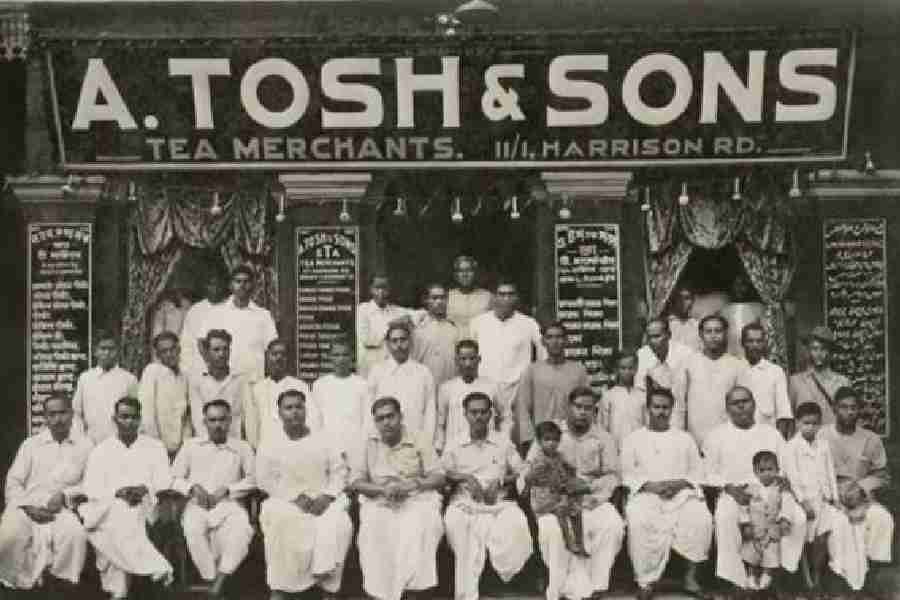
Pre-Partition, East Bengal (now Bangladesh) was also a great market for tea. One of the Ghosh brothers, Amulya Charan, used to travel for days in a big van with Tosh tea, some essential supplies, camp at various villages and sell tea. “I have heard he would have a magician along, to keep the kids busy at these villages, so that the adults were not troubled while buying tea. I think he was a pioneer when it came to sales and marketing strategy,” smiles Abhijit. The focus till then was the domestic market.
During the 1950s, the company got their first export breakthrough. Bhabatosh, Prabhash’s son, was successful in registering A. Tosh & Sons as the first Indian company to purchase and ship tea for the USSR government. The company then started exporting to other countries like the Netherlands, Iraq, Iran, Poland and Egypt as well. Ghosh family’s other second-generation member Kanailal was instrumental in establishing the Tea Board headquarters in Calcutta in 1954. In 1961 he became the first Indian non-white chairperson of the Calcutta Tea Traders Association as well. Kanailal, with other family members, hosted Prime Minister Jawharlal Nehru, and also Queen Elizabeth II and Prince Philip during their visit to the city, over Tosh tea.
Covid has changed the entire dynamics of tea business, export being hit the most. But the domestic market is promising believes Abhijit, as youngsters are now into speciality teas. A gourmet range of tea, The Hillcart Tales, was launched by the brand in 2017.
Anglo-Swiss Watch Co
Retails: Watches and clocks
Where: 6 B.B.D. Bag East, Calcutta 700001
Established in: 1908
E.O. Gammeter, a Swiss watchmaker and jeweller, opened a watch and jewellery shop in erstwhile Dalhousie Square, called Anglo-Swiss Watch Co. By 1925, the firm had become one of the biggest in undivided India, and even had a branch in Singapore. The shop in India was bought by S.M. Sayeed in 1943. He continued with the businesses of servicing and selling Swiss watches. Later, he started manufacturing wall and tower clocks. “In those days Anglo-Swiss watches were made in Switzerland where my grandfather would travel, order watches and import them by sea. Back then, we would sell around 1,000 Swiss watches every day as they were available for retail and wholesale,” recalls Sajid Ismail, the third generation in business, who has learnt watch-making from Switzerland.
The company now has several verticals — retailing other brands, selling their own assembled Anglo-Swiss modern watches, servicing old and modern pieces, and making tower clocks. The clock at Eden Gardens (above the scoreboard) is also an Anglo-Swiss Watch Co piece. They recently repaired the Burdwan Rajbati clock which was “dead for the past 20 years.” With vintage watches and clocks, the challenge is to find spare parts. “We often need to use a part from a donor watch which is called cannibalising. Old timepieces may not maintain correct time, but still people like to keep them. More so in Bengal, where heritage is such an important part, they keep these are heirloom. A lot of our customers get watches from previous generations for service and repair,” adds the 50-year-old.
Keeping technology in mind, Anglo-Swiss Watch Co has now developed tower clocks that run with GPS signal. “These clocks show accurate time. Previously we had mechanical tower clocks which used to lose time and regular maintenance was a hassle. Repairing them was also tough. These new GPS clocks have reduced the regular maintenance part totally,” said the horologist. You can spot them around Calcutta, one being near Central mall in New Town.
Tips from Sajid: In case of quartz watches, get battery replaced at the earliest once the watch stops. Mechanical watches need to be serviced at an interval of five years. Try to wipe the watch with a cloth after every use to clean the dust and sweat.
Pen Hospital
Retails: Pens
Where: 9B Jawharlal Nehru Road, Calcutta 700013
Established in: 1945
At this ‘hospital’ in Esplanade, there’s a long collection of vintage ‘patients’, from as early as 1930s. Patients here are pens, which need to be treated with care and deft hands. Mostly fountain pens. Though more of a collector’s item for the younger generation as opposed to earlier when everyone used a fountain pen, having a Pen Hospital in the city was a necessity. This blink-and-miss-it asbestos-roof shop with faded walls tucked away beside the Esplanade metro station heals both Indian and foreign make pens. Parker, Sheaffer, Waterman and Montblanc are some of the vintage pens being treated at Pen Hospital, which was started in 1945 by Mohammed Shamsuddin. He used to sell, service and repair pens. Pen lovers and curious tourists visit this shop to repair their writing instrument or to buy new ones available at affordable prices.
“The craze for pens never died in Calcutta. You can understand it by the rush you just saw here. They came to buy pens. Most people don’t know how to use and take care of these pens, which we help them with,” says Mohammad Imtiaz, who is assisted by his nephew Mohammad Shahbaz Reyaz in continuing the family business. “The demand for vintage pens in Calcutta is such that we often can’t keep pace with it. Someone has been looking for a Sheaffer Imperial from 1970s, which is now obsolete. So, we keep their contact, take order and get back once we get it,” informs Imtiaz, his hands stained with blue ink from dealing with pens through the day. Most repairs like fitting and refilling are done in the shop itself, while some which need bodywork repair are sent to their workshop nearby. The shop remains closed on Sundays.
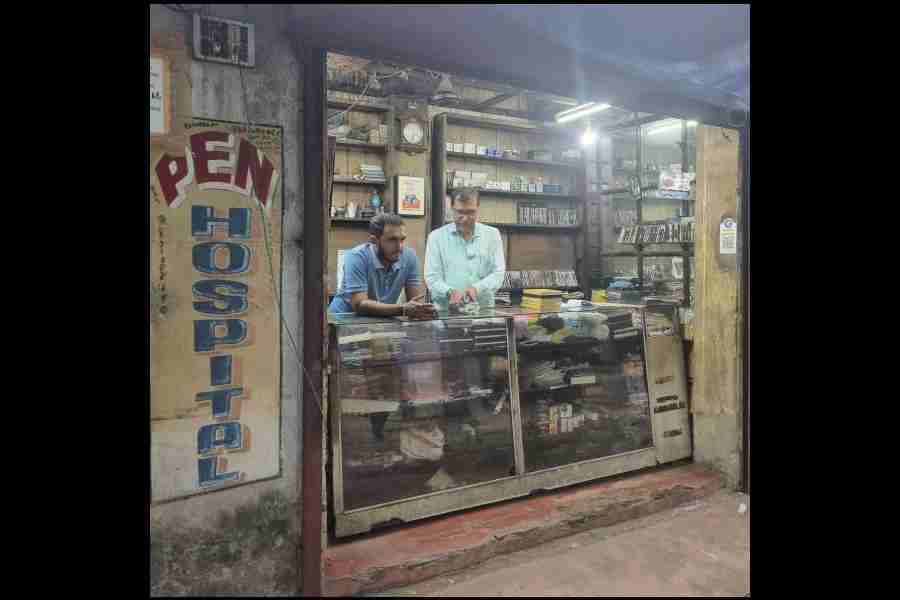
Pro tip for fountain pen: Empty the ink and wash the pen with plain water after every two weeks.
